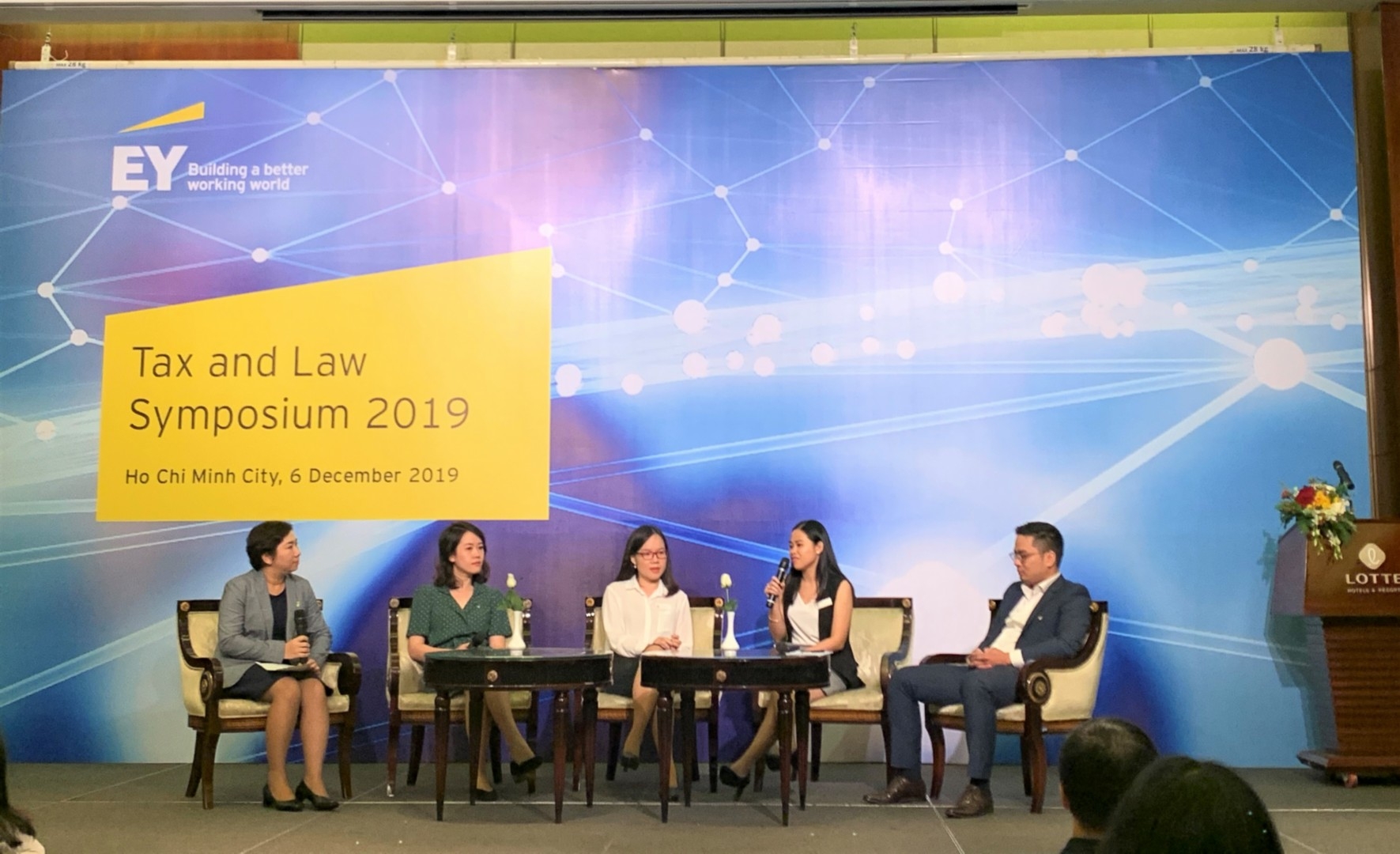EY Consulting Vietnam: enterprises need to prepare for tax changes
 |
| Panel discussion on how Vietnamese enterprises need to prepare for changes in tax policy |
At the Tax and Law Symposium 2019, experts from EY Consulting Vietnam emphasised that apart from handling tax issues appropriately and reducing tax costs, enterprises also need to take care of potential risks of non-compliance, especially in a fast-growing digital business environment.
A new Law on Tax Administration in 2019, recent proposals on the application of International Financial Reporting Standards (IFRS) in Vietnam, as well as previous decrees on e-invoices and transfer pricing all share the same goal of raising Vietnamese tax regulations to international standards in order to have a more effective system for both government authorities and taxpayers in tax administration, collection, and tax dispute resolution.
These policies not only introduce new tax treatments such as e-commerce transactions, re-auditing, or the application of penalties but also propose new regulations of tax compliance and audit management.
Apart from handling tax issues properly, enterprises also need to focus on managing supporting documents appropriately, especially proofs of digital transactions which are increasingly common nowadays. It is not only about the collaboration among an enterprise’s internal functions, but also among subsidiaries and parent companies or headquarters abroad.
Continuous changes in technology under the Industry 4.0 wave not only have a strong impact on the business performance of enterprises but also put pressure on the need to digitalise their tax reporting activities in the context of government agencies are also applying more and more IT achievements in tax management and tax inspection activities. Enterprises, therefore, need to review and restructure their internal process in data management and exchange, in order to be able to “communicate” with digitalised tax management systems.
To help enterprises comply with tax regulations and ready themselves for changes in tax policy, as well as avoid potential non-compliance risks, four important notes were recommended by EY Consulting Vietnam’s professionals at the workshop. Accordingly, enterprises need to understand all types and processes of tax inspection, timeline, and specific requirements of each type of tax inspection. Secondly, they need a complete and strict data management method, avoid losing data when changing manpower, changing offices or cyberattacks, among others and be ready to extract data when there are tax inspections.
In addition, an enterprise needs a methodical plan to manage tax risks and implement the best risk management practices recommended by experts such as investing on the improvement of employee performance, internal review regularly, fixing mistakes available, being well-prepared before inspections. Finally, they should make appropriate choices when tackling tax disputes to ensure compliance whilst reduce the damages which are caused by disputes.
Tax and Law Symposium 2019 is the major annual event organized by EY Consulting Vietnam to help businesses update tax policy changes, related policies, global, regional and local tax trends. The workshop helped answer enterprises’ questions in tax compliance and related regulations, as well as provide recommendations to build more effective tax and tax risks management plans.
What the stars mean:
★ Poor ★ ★ Promising ★★★ Good ★★★★ Very good ★★★★★ Exceptional
Related Contents
Latest News
More News
- State corporations poised to drive 2026 growth (February 03, 2026 | 13:58)
- Why high-tech talent will define Vietnam’s growth (February 02, 2026 | 10:47)
- FMCG resilience amid varying storms (February 02, 2026 | 10:00)
- Customs reforms strengthen business confidence, support trade growth (February 01, 2026 | 08:20)
- Vietnam and US to launch sixth trade negotiation round (January 30, 2026 | 15:19)
- Digital publishing emerges as key growth driver in Vietnam (January 30, 2026 | 10:59)
- EVN signs key contract for Tri An hydropower expansion (January 30, 2026 | 10:57)
- Vietnam to lead trade growth in ASEAN (January 29, 2026 | 15:08)
- Carlsberg Vietnam delivers Lunar New Year support in central region (January 28, 2026 | 17:19)
- TikTok penalised $35,000 in Vietnam for consumer protection violations (January 28, 2026 | 17:15)

 Tag:
Tag:




















 Mobile Version
Mobile Version